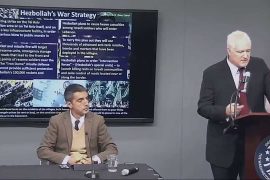1) At WINEP, David Schenker discusses the effect of the current war on Israel-Egypt relations.
“In January, another official noted that Egypt had “destroyed over 1,500 tunnels” along the Gaza frontier over the years, rendering any further smuggling operations “impossible.” Indeed, Egyptian forces famously flooded several tunnels in 2015 to stem the prodigious flow of weapons between Sinai insurgents and Hamas. After entering Rafah earlier this month, however, Israeli forces announced the discovery of at least fifty tunnels crossing into Egypt. No doubt, this disclosure is a source of embarrassment to Cairo. For many observers, these tunnels confirm Egypt’s complicity—whether through bribery or negligence—in the smuggling of weapons that enabled Hamas to carry out the October 7 attack.”
2) Also at WINEP, Matthew Levitt and Neomi Neumann explain why ’“Moderate” Hamas Statements Are an Old Ploy’.
“Since October 7, Hamas leaders have issued a steady stream of statements promising war until Hamas destroys Israel and replaces it with an Islamist Palestinian state. Recently, however, some Hamas officials have issued more moderate statements, even suggesting the movement would consider a five-year truce with Israel based on the 1967 ceasefire lines. While some see such statements as “a significant concession,” Hamas has a long history of hinting at moderation as a means of gaining international support so it can continue “resistance” through political means.”
3) The ITIC provides a report on ‘Israel, Jews and Peace in Schoolbooks and Teachers’ Guides Used in UNRWA Schools in Judea, Samaria, East Jerusalem and the Gaza Strip’.
“The schoolbooks issued by the Palestinian Authority (PA) are mandatorily used in all areas of Judea, Samaria, the Gaza Strip and East Jerusalem (In schools that follow the PA curriculum) – in government, private and UNRWA schools. The books surveyed here are of the latest edition and are used in the current school year. They were mostly published in 2020. Teachers’ guides, mostly published in 2018, were examined as well. They shed special light on the PA indoctrination process which is also applied in UNRWA schools.”
4) NGO Monitor documents the reactions of NGOs to the news that the ICC is seeking arrest warrants against Israeli officials.
“International, Palestinian, and Israeli NGOs celebrated the decision, demonizing Israel with allegations of “apartheid” and “crimes against humanity.” Confirming the politicized nature of their ICC campaign, these reactions overwhelmingly singled out Israel as targets for prosecution and downplayed the culpability of the named Hamas officials.
For over a decade, these same NGOs have pushed the ICC to investigate, indict, and arrest Israeli officials. This includes NGOs linked to the Popular Front for the Liberation of Palestine (PFLP) terrorist organization, groups that deny Israel’s right to exist as a Jewish state, and BDS supporters.”
5) At Ynet, Ben Dror Yemini gives his view of the recent rulings and announcements from the ICJ and ICC.
“Historically, before the establishment of the ICJ and ICC, actual war criminals faced trial in special courts, as seen in Nuremberg and Tokyo post-World War II. Today, however, there is no practical mechanism to hold Hamas accountable, even if an international tribunal ruled against them. These criminals could still traverse the oppressive bloc, from Ankara to Doha, Beijing, Johannesburg, and Moscow. What value does international law hold if it cannot punish the perpetrators of terror and oppression but might impede democratic nations from targeting these power centers? This is the essence of the recent rulings by the ICJ and ICC against Israel.”
6) The Jerusalem Post reports on the account given by a Kurdish doctor of his recent visit to the Gaza Strip.
“Hamas continues to exploit hospitals, Baram said in the interview. It is a political and military organization that “needs to exploit all these places for survival, and that’s unfortunate, but I saw that hospitals had been used for hiding Hamas leaders,” he said.
Baram said he had spoken to a founder of Hamas in one of the hospitals and sat with him for coffee. The Gazans must accept that Hamas uses their hospitals as bases, because they cannot ask it to leave, he said, adding that this is the reality.”





